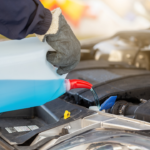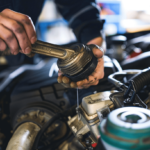Summer is a great time to hit the road and explore new destinations. However, before you pack your bags and take off, it’s important to ensure that your car is in top condition.
Proper summer car maintenance is essential for the safety and performance of your vehicle. Unfortunately, many people make common mistakes that can lead to costly repairs or even accidents on the road.
Table of Contents
The Importance of Summer Car Maintenance
Regular car maintenance is important throughout the year, but it’s especially crucial during the hot summer months. High temperatures can put extra strain on your car’s engine, tires, and other components. Neglecting necessary maintenance tasks can lead to breakdowns or even accidents.
Summer also means more driving for many people. Whether you’re planning a long road trip or just commuting to work every day, it’s important to make sure that your car is in good shape so you can avoid unexpected breakdowns or other problems.
Mistakes People Make During Summer Car Maintenance
Many people think that they are doing everything right when it comes to maintaining their cars during the summer months. Unfortunately, there are some common mistakes that people make which can have serious consequences.
In this article, we will discuss the top 5 most common summer car maintenance mistakes people make and how these mistakes can be avoided. By following our tips and advice, you’ll be able to keep your car running smoothly all summer long and avoid any unnecessary headaches along the way.
Neglecting Tire Pressure
The Importance of Proper Tire Pressure in the Summer
Many people don’t realize that tire pressure is particularly important during the summer months. As temperatures rise, so does the pressure inside your tires.
If your tires are already overinflated, this can lead to uneven wear, poor handling, and decreased fuel efficiency. Conversely, if they’re underinflated, they can overheat and even blow out on hot roads.
In addition to safety concerns, neglecting your tire pressure can also cost you money in the long run. When your tires are underinflated, they create more resistance on the road which makes your engine work harder and burn more fuel.
This means you’ll be spending more money at the pump than necessary. Overall, maintaining proper tire pressure is essential for both safety and financial reasons.
Tips for Checking and Maintaining Proper Tire Pressure
To ensure that you’re driving with proper tire pressure during summer months (and all year round), there are a few simple steps you should follow: 1. Check Your Owner’s Manual: The first thing you need to do is find out what the recommended tire pressure is for your specific vehicle.
This information can be found in your owner’s manual or on a sticker located inside the driver’s doorjamb. 2. Purchase a Tire Pressure Gauge: Next, purchase a digital or analog tire pressure gauge from an auto parts store or online retailer.
3. Check Your Tires Regularly: You should aim to check your tire pressure at least once a month when tires are cool (i.e., haven’t been driven for several hours). Simply remove each valve cap and use the gauge to check the PSI reading on each tire.
4. Adjust as Necessary: If any of the readings are too high or too low according to manufacturer specifications in step 1, use an air compressor or a service station’s tire inflation equipment to add or remove air as necessary. By following these tips, you can ensure that you’re driving with the proper tire pressure all summer long, which will ultimately save you money and keep you safe on the road.
Skipping Oil Changes
The Importance of Oil Changes in the Summer Months
Oil changes are a crucial aspect of car maintenance during the summer months. The hot weather can cause your engine to work harder, which means that it needs more oil to lubricate its moving parts. If you neglect this aspect of maintenance, it can lead to serious consequences such as engine overheating or breakdowns.
Additionally, the hot temperatures during summer can make motor oil break down faster, causing it to lose its effectiveness and ultimately damaging your engine. As such, it is essential that you change your oil at regular intervals to ensure that your car is running smoothly and efficiently all summer long.
Tips on When to Change Oil and What Type of Oil to Use
How often you should change your oil depends on various factors including how often you drive and the type of oil used in the car. For most cars, it’s recommended that you change your oil every 5,000 miles. However, if you use synthetic oils or have an older vehicle with higher mileage, then you may need to change it more frequently.
When choosing what type of oil to use for summer car maintenance, consider using synthetic blends or full synthetic oils as they tend to perform better in high temperatures compared to conventional oils. You should also check your owner’s manual for specific recommendations by the manufacturer for your particular make and model.
Skipping oil changes can have detrimental effects on your vehicle’s performance during summer months. Be sure to keep up with recommended intervals and use appropriate types of motor oils for optimal performance and longevity of your vehicle.
Ignoring Air Conditioning Issues
Why a functioning air conditioning system is important in the summer months
When it comes to driving during the hot summer months, there’s nothing more important than having a functioning air conditioning system in your car. Not only does it keep you comfortable while you’re on the road, but it also helps to prevent fatigue and dehydration.
If your air conditioning isn’t working properly, it can make for an extremely unpleasant driving experience. One of the biggest reasons that a malfunctioning air conditioning system can be dangerous is that it can cause you to become overheated while driving.
This can lead to dizziness, headaches, and even fainting. It’s essential that your air conditioning system is working properly so that you stay safe and comfortable on the road.
Tips on how to identify and fix air conditioning issues
If you’ve noticed that your air conditioning isn’t blowing as strongly or as cool as it should be, there are a few things that could be causing the issue. One common problem is low refrigerant levels.
Over time, refrigerant can leak out of your car’s AC system which causes poor cooling performance. Another issue could be a clogged condenser or evaporator; this would prevent proper airflow through the AC system.
To identify these issues yourself, you’ll need to perform some basic checks: first check if there are any visible leaks around hoses and connectors; then check if all fuses related to A/C are functional; finally if everything looks good so far but A/C still doesn’t work as expected visit an accredited service center for diagnosis of issues like compressor failures or other internal issues with components such as compressors or condensers. Making sure your air conditioning is in tip-top shape before summer hits is essential for maintaining not only comfort while driving but safety as well!
Forgetting About Coolant Levels
Why Coolant Levels are Crucial in the Summer Months
When it comes to summer car maintenance, coolant levels are one of the most important things to keep an eye on. Coolant is responsible for regulating the temperature of your engine, and when temperatures rise in the summer months, your engine can easily overheat if there isn’t enough coolant present. Overheating can cause serious damage to your car’s engine and even lead to costly repairs or replacements.
In addition to preventing overheating, proper coolant levels also help protect against corrosion and rust within your car’s cooling system. Without enough coolant circulating through your system, metal parts can start to corrode and rust, leading to leaks or other problems down the line.
Tips on How to Check and Maintain Proper Coolant Levels
Checking and maintaining proper coolant levels is relatively easy, but it’s important to do it regularly throughout the summer months. To check your coolant levels, first make sure that your engine is completely cool before opening the hood. Use a dipstick or visual inspection of the plastic reservoir tank (which will be labeled “coolant” or “engine coolant”) that shows the level of liquid: if it’s below “minimum”, add more.
When topping off your car’s coolant levels with new fluid be careful not mix different types which can produce disastrous results (if you’re not sure about what kind of antifreeze/coolant you should use make a search online using phrases like “proper antifreeze/coolant for [your car model]”). By taking simple precautions such as keeping an eye on fluid levels you’ll enjoy a trouble-free driving experience all summer long!
Overlooking Battery MaintenanceThe Importance of Battery Maintenance in the Summer Months
Your car’s battery is what keeps everything running smoothly. Without it, your car won’t start or might break down unexpectedly. In summer, heat can cause rapid evaporation of fluids, including battery fluid.
This can cause corrosion on the terminals and prevent your battery from charging properly. Extreme heat can also cause cracks in the battery casing and damage to internal components.
A dead battery is inconvenient at best and dangerous at worst, especially if you are traveling in a remote location. Taking care of your car’s battery is not only important for the health of your vehicle but also for your own safety. Tips on How to Check and Maintain a Healthy Battery
To maintain a healthy battery during summer, you should start by inspecting it regularly for any signs of corrosion or damage. Use a soft-bristled brush dipped in baking soda to clean off any corrosion on the terminals.
Also, check the voltage with a multimeter to ensure that it is between 12-12.6V.
The heat can quickly drain a weak battery so ensure that it has enough electrolytes by adding distilled water if necessary.
It’s also recommended that you drive longer distances occasionally as this helps charge the battery faster than short trips around town.
If you are unsure about how to test or replace your battery, take your car to an auto repair shop or dealership for professional assistance.
Don’t be caught off guard by a dead car battery! By following these tips, you will be able to keep your vehicle running smoothly all summer long.
Conclusion
Recap of the top 5 most common mistakes people make during summer car maintenance
Summer is a time for fun and relaxation, but it’s important not to forget about your car’s maintenance needs during this season. Neglecting your car can lead to costly repairs and even dangerous situations on the road. Here are the top 5 most common mistakes people make during summer car maintenance:
First, neglecting tire pressure can lead to blowouts and reduced fuel efficiency. It’s important to check and maintain proper tire pressure regularly.
Second, skipping oil changes can cause engine damage and decreased performance in hot weather. Make sure you change your oil at regular intervals and use the recommended type of oil for your car.
Third, ignoring air conditioning issues can leave you feeling hot and uncomfortable during long drives. Be aware of any strange sounds or smells coming from your AC system, and get it checked out if there are any issues.
Fourth, forgetting about coolant levels can cause overheating and engine damage on hot days. Check coolant levels regularly and top them off as needed.
Overlooking battery maintenance can leave you stranded in the middle of nowhere with a dead battery. Make sure to check your battery’s health regularly and replace it if necessary.
Encouragement for readers to take care of their cars during the hot season
Taking care of your car in the summer doesn’t have to be a chore—it can be a fun part of enjoying the season! Regular maintenance will not only keep you safe on the road but also help prolong the life of your vehicle overall.
So why not take a little time this summer to give your car some TLC? Schedule regular maintenance checks with your mechanic so that they can catch any potential problems before they become major issues.
Take care of small problems as soon as they arise—this will save you money in repair costs in the long run. And don’t forget to keep your car clean inside and out, so that it stays looking and feeling like new.
With a little bit of effort, you can make sure that your car is ready for all the summer adventures you have planned. So go ahead, hit the road with confidence, knowing that your vehicle is in top shape!






